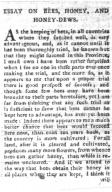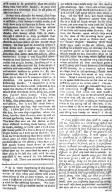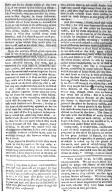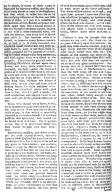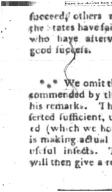[ Essay on Bees, Honey, and Honey-Dews ]
Date: 1789/12/01
Source:
Nova Scotia Magazine
Institution: Nova Scotia Archives
| Source Origin: Nova Scotia Newspapers on Microfilm
| Reference: Microfilm Reels 8062, 8063
An extensive discussion of the flower preferences and habits of bees followed by an argument for keeping bees in Nova Scotia. An appendix to the article explains that the article's treatment of bees has not been published, nor will be until the author has made "actual experiments upon these useful insects." nn.423-27. Microfilm Reel 8062.
ESSAY ON BEES, HONEY, AND
HONEY-DEWS.
AS the keeping of bees, in all countries
where they succeed well, is very
advantageous, and, as it cannot until it
has been thoroughly tried, be known but
that they might succeed in this Province.
I must own that I have been rather surprised
when I see no one in these parts ever once
making the trial, and the more so, as it
appears to me that upon a proper trial
there is good prospect of success; and
though some few bees may have been
brought to these parts heretofore, yet I am
far from thinking that any such trial as
is sufficient to shew that bees cannot be
kept here to advantage, has ever yet been
made: Indeed there appears to me a much
better chance that bees would succeed
here now, than even ten years back, as
the country is more cultivated: For all
land, after it is cleared and cultivated,
produces many more flowers, from whence
bees can gather honey, than while it re-
mains uncleared. And if we attend to
the way that bees obtain their honey in
all places where they are kept, I think it
will make it so probable that we might
keep bees here with success, as may well
encourage a thorough trial in all parts of
the Province.*
It has been thought by many, that bees
make their honey, but this is undoubtedly
a mistake; their honey is ready made, and
they have only to separate it from any he-
terogeneous matter that may be mixed
with it, and to collect it. ‘Tis past a
doubt, that honey often falls in dews,
though I think it is very probably that
these honey dews are much more consi-
derable in some parts of the world than
others. In that part of America where I
was born and brought up, they were
common, and I did not then suspect
but that the same was the cafe in other
countries: so that I was surprised after-
wards to find Quincy, in his Dispensatory,
under the article honey, speaking of it as
what had been noticed by some medical
writers and naturalists, and quoting seve-
ral ancient authors to prove it: By this
I perceived, that if known at all in Bri-
tain, yet it was not so common there as in
America. He quotes from Galen the
following words: ‘I remember I have
sometimes in the summer observed honey
upon the leaves of trees and plants, inso-
much that the hinds have, with joy, cried
out, Jupiter rains honey.’ This, from
Galen, is a description of a honey-dew:
it falls, like other dews, upon all leaves
and plants, but is not like them soon e-
vaporated by the sun, but continues all
day. I once saw such a dew the whole of
the day, for two days together, when the
bees, leaving their flowers, were spread all
abroad gathering honey from every leaf:
The dew that was on the leaves at this
time differed nothing from honey, either
in looks, feeling, or taste; and I took from
the lower point of a leaf a drop of as pure
virgin honey as I ever eat in my life: Yet
I am far from thinking that bees collect the
chief part of their honey from dews so
considerable as the above; they may col-
lect much honey from dews in which
there is not honey enough mixed with the
other dew to be perceived by men; and
that this is in fact the cafe will be very
manifest if we attend to the following
things: 1st. There are certain flowers up-
_______________________________
*It is truly suprizing if the experi-
ment has never been made. We hope the
writer of this essay and others will avail
themselves of the present winter, to pro-
cure a sufficient number of hives, to make
a trial in the ensuing summer. We can-
not see any well grounded reason to doubt
the success.
on which bees work only in the dew of
the morning. 2d. There are others upon
which they never will till the dew is off;
and a third sort upon which they work all
day. Of the first sort, are buck wheat,
mullein, &c. However many bees you
see in a field of buck wheat in the fore-
noon, yet you may in vain look for a bee
in it in the afternoon; the same is true
of mullein and many other flowers. Fur-
ther, the flowers, upon which they work
in the dew of the morning have gene-
rally, but on petal or flower-leaf, and
are funnel shaped, standing with their
wide tops open to the air above, and
ending in a honey cup, or coming to a ve-
ry narrow point at the bottom; and that
which would be too inconsiderable to be
noticed, even by a bee, when spread over
a large surface, would be very perceivable
when collected all into one small point;
and I never yet found flowers of this shape
in the woods, in a country where bees
are kept, but in the morning I could find
bees upon them, but never at any other
time. Now I would query, why the bees
work upon these flowers in the dew of the
morning and at no other time? The an-
swer doubtless must be, because they col-
lect something from them then, which
they cannot find when the few is off:
For if the same was to be obtained when
the dew was off, no reason, I think, can
be assigned for their ceasing to work upon
them at the going off of the dew, it re-
mains then to shew what that something
is, and as bees are never known to collect
anything but honey or wax, * I think
________________________________
* I am sensible that some will be ready to
tell me that there is a third thing which the
bees collect that is commonly called bee-bread,
and ‘tis thought by some that this is a necessary
part of their food: But if we attend to the
following consideration, it will appear to
be something of a different nature: 1. In
swarms of the first year there is but little of
the bee-bread to be found, yet it is a substance
that is constantly increasing as the swarm grows
older, so that in some very old stocks it will be
difficult to find any comb that is eatable. 2.
There are several months every year that the
bees never go out; and yet all this time they
live by eating, being not like some animals in a
sleepy state, as any one will perceive by putting
his ear to the hive and giving it a little rap.
But the stores of honey that they consume in that
period, in which they keep wholly within, suffi-
ciently shew, that they eat then as at other
times. 3. We know of no animals, however
small, that are constantly supported by eating,
but must also have proportional evacuations;
this then can be no other than the excrement of
the bees: they have no sooner built themselves
some comb than some cells are set apart for that
purpose, which are no sooner filled than they
are scared up, perfectly tight, impenetrable even
by air; in this way their streets and alleys,
their houses, their honey, &c. Are all kept perfect-
ly clean and neat, and there are no bad sinells to
affect their fine and delicate organs through the
whole of their confinement.
there can be no doubt which of the two
it is, if we attend to the following things:
First, these flowers have generally a honey-
like sweetness, very perceivable in them,
even to that degree, in some instances,
that some have thought it worth their while
to make use of some means to extract the
same as may be seen in the dictionary of arts
and sciences, under the word verbascum:
This alone, makes it very evident, that
honey is what they collect from these
flowers; and if it should appear most pro-
bable that they collect their wax from those
flowers upon which they work after the
dew is off, and at no other time, this will
make it more evident.
Now the anthera which grow upon the
tops of the stamina of flowers, contain an
exceeding fine yellow dust, which is found,
when carefully examined, to be of a gluti-
nous adhesive nature, like wax, and is
doubtless the wax itself in exceeding mi-
nute grains, and needs nothing more than
to be squeezed and worked together by the
bees into a more solid body, to take the ap-
pearance of wax as it does on their yellow
legs, with which they appear loaded when
they work on flowers after the dew is off.
Let any one make the trial, and he will find
it very difficult to make small pieces of
wax adhere together when they are wet;
but let them be dryed, and a little soften-
ed by lying in the warm fun, and the diffi-
culty will be removed. The same is the
case with the savina in flowers; to that as
the dew of the morning appears to be the
chief time for collecting honey, so the sun-
ny dry part of the day appears to be pecu-
liarly suited for collecting their wax. A-
nother thing should be observed here, which
is, that the flowers upon which they work
in the dry part of the day, appear, many
of them, to abound very much with the
aforementioned savina, so that one’s cloaths
would be covered with the same, only by
walking through the flowers where they
stood thick.
Now, since the flowers which they work
upon in the dry part of the day only, a-
bound much with that substance, from
which they undoubtedly make their wax,
and those which they work on in the dew of
the morning only, all evidently taste of ho-
ney, I think there is not much doubt but
that they collect their honey from the lat-
ter; and that they can do this only in the
dew is also evident from their ceasing to
work in these flowers at the going off of
the dew.
And this honey, I think, must fall with
the dew; for if it was separated from the
natural juice of the plant by secretory
vessels, and by them deposited in the ho-
ney glands, at the bottom of the flowers,
it might be obtained at all times as well
as in the dew of the morning; which is
not the case with respect to that particular
kind of flowers we have been speaking of.
But then there is a third kind of flowers,
as we observed at the first, upon which
the bees work all day, both when the dew
is on, and when it is off: Of this kind is
the white clover, which is also by many
called white honeysuckle, as it is said to
taste of honey; this has a compound
flower, consisting of many tubular florets,
which though of some depth, are very slen-
der and small at the top as well as bottom,
so that the dew having one settled to the
bottom of these slender tubes, would hard-
ly be dried off through the whole day; and
thus they might be found gathering honey
from flowers of this kind through the
whole day, though there was no honey
but what fell in the dews: But it is rather
my opinion that in flowers of this kind,
the honey is separated from the natural
juice of the plant by secretory vessels; and
deposited in honey glands in the flower:
For these flowers have no wide tops spread
abroad to draw in the dew: The same is
the cafe with the blossom of every species
of willow; and yet each catkin, or little
head of flowers, has in the middle of it, a
cylinderical gland filled with honey.
Honey then, it would seem, constitutes
a part of those vegetable juices which are
prepared in the earth by nature, or rather
by the great Author of Nature, for the
nourishment of vegetables in general; part
of which is taken up by the plants of
the earth, and part of which being like
the other moisture of the earth, rarified by
the sun’s heat, and raised into the air, falls
down in dews.* Of that which is taken
__________________________________
*This would to us, in itself, appear
unaccountable. We are much more dis-
posed to adopt the theory of the Abbé
Bouffier, whose remarks we annex at large,
not only as an explication of this pheno-
menon, but as they exhibit another very
curious source of honey. Whatever may
be the cause that produces these dews, it
would be of more importance to ascertain
the fact, whether they have been found
upon plants in this province.
up by plants, in many of them a part is
separated by secretory vessels, and deposit-
ed in honey glands or cups in the blossoms;
and that which is raised into the air by
the rarifying influence of the sun, and falls
down in dews, is a part of it collected in
the bottoms of such flowers as spread their
wide open tops like a funnel abroad in
the air; though sometimes nature, dealing
it out with a more bountiful hand, not
only the flowers, but every leaf is spread
over with it: But however wide it is
spread, or however many flowers contain
it, at best it is so thinly scattered, that
mankind could receive but very little be-
nefit from it, were it not that a little in-
sect is prepared for the purpose of collect-
ing it--small indeed--but very numerous,
and with organs every way suited to the
purpose. These with the greatest industry
spreading themselves abroad on every
flower, and every place where honey is
scattered, carefully gather the minutest
grains of it wherever they find it, till thus
by little and little, in the course of the sea-
son, they lay up large stores. Thus they
who keep bees, without any labour of
their own, or any other cost than that of
finding houses for these emblems of in-
dustry, are furnished yearly with good
store of that, which is past a doubt, the
most wholesome, and elegant sweet in na-
ture, and one of the greatest delicacies of
life.
Now, why should we of Nova-Scotia,
be so inattentive to our own interest as ne-
ver once to try if we may not be sharers
with others, in that which is manifestly
intended as a common benefit? It is indeed
possible, that upon trial, bees would not
be found to do well here: Yet it appears
to me, that it is much more likely that
bees would do well here than other-
wise.
Buckwheat, mullein, and white clover,
are the most capital flowers, that they
have in New England for bees to work on.
Buckwheat bids fair to succeed the best of
any grain in Nova-Scotia; and mullein,
where it is put in, thrives well; so that I
have no doubt but that we may soon have
it growing in our highways, old fields, &c.
And as to white clover, whether we keep
bees or not, the sooner we have our feed-
ing pastures covered with it the better, for
nothing equals it for feed, both for horses
and cows; and I think, by some little trial
that I have made, that it will thrive
well, even upon our gravelly hemlock
land. As white clover is a flower from
which bees undoubtedly gather honey the
whole day through, there is no one per-
haps, of more consequence to bees than
this. Besides the above, have plenty
of wild flowers here, upon which bees used
to work much in the American States.
The white willow thrives well here; and
upon some ground I have seen other spe-
cies of willow springing up spontaneously
by little runs of water, and other places
where the land was cleared; as the blos-
soms of the willow are rich with honey,
this affords them a supply early in the
spring, before many other blossoms o-
pen.
Perhaps it may be thought that the
winters are too cold: But there can be
no great difficulty upon that account; for
with very little trouble the bees might be
kept warm enough, even if the winters
were much colder than they are: The
length of the winters has more the ap-
pearance of an objection than their cold-
ness; but even this does not appear to
me to be of any great consequence: Our
springs may be a month later than they
are in the State of Massachusetts; but
then the frost keeps off two and some-
times three weeks later here at the fall
than it does with them: But let it be that
our winter is really a month longer than
theirs; that is, that they have five months
and we fix, in which the bees must live
upon their stores, yet I am persuaded that
the bees there, in the course of one sum-
mer, often collect honey enough to last
twelve months instead of six. But sup-
posing those bees which are left to stand
through the winter, should not always have
honey enough to last them through the
winter, as was sometimes the case with
some hives there; yet it is but a light thing
for their owner to feed them, towards the
spring, if he should perceive their hives
grow light, with some part of the honey
which he had from the hives he took up
in the fall. Upon the whole, if the sum-
mer here should prove as rich in honey in
proportion to the length of it, as it is in
Massachusetts, Connecticut, &c. every o-
ther objection, it appears to me is of no
consequence: If the same flowers here are
as well loaded with honey as they are there,
the summer is long enough; we may keep
bees here to good profit. Some countries
doubtless abound more with honey than
others, when the same kind of flowers flou-
rish alike in both. Whether that country
is better than this, or both are equally
good, can be ascertained only by the trial.
A field of buckwheat here, smells as strong
of honey as it does in the States, nor shall
I conclude that it is not as plenty till I see
it tried: I cannot but wish therefore that
the trial might be made; and that it might
be made not by a few, but by many per-
sons in different parts of the province:
For in that case though some might not
succeed, others might. Some people in
the States have failed in their first attempts,
who have afterwards repeated it with
good success
G.
*** We omit the treatment of bees re-
commended by this writer, with many of
his remarks. Thinking what we have in-
serted sufficient, until we shall have learn-
ed (which we hope will be soon) that he
is making actual experiments upon these
useful insects. To his observations we
will then give a ready reception.
_______________________
Download: Transcription | Images
